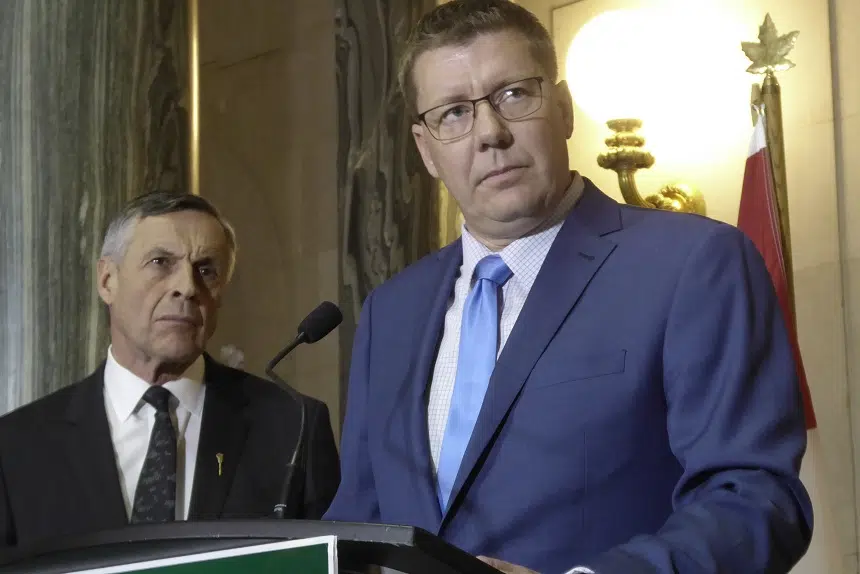Saskatchewan’s Court of Appeal has denied the provincial government’s challenge on the federal government’s carbon tax.
In a decision released Friday in Regina, the judges voted 3-2 to reject the Sask. Party’s argument that the federal government didn’t have the constitutional power to collect the carbon tax in Saskatchewan starting April 1.
In the majority decision, Chief Justice Robert G. Richards wrote that the federal government has the constitutional power to establish a price for greenhouse gas emissions — something that the province disputed in its argument.
“The pith and substance of the Act is about establishing minimum national standards of price stringency for GHG emissions,” wrote Richards, whose decision was concurred with by justices Gergina Jackson and Lian Schwann. “Parliament has jurisdiction over this subject matter by virtue of the national concern branch of (peace, order and good government).”
However, Richards rejected the federal government’s contention that it should have sole jurisdiction over the issue of greenhouse gas emissions.
“This approach must be rejected because it would allow Parliament to intrude so deeply into areas of provincial authority that the balance of federalism would be upset,” he wrote. “Further, it would hamper and limit provincial efforts to deal with GHG emissions.”
Justices Ralph Ottenbreit and Neal W. Caldwell dissented with the majority’s decision.
“Parliament and the Provincial legislatures are sovereign within their own heads of power or spheres of jurisdiction,” the minority wrote. “Canadian federalism enshrines the principle of autonomy at each level of government so as to permit independent development and promotion of local and national political and policy priorities within the enumerated heads of power.”
The sides presented their cases to the Court of Appeal in February, with lawyers for the Government of Saskatchewan laying out the province’s argument on Feb. 13. Interveners also shared their thoughts with the judges.
The following day, lawyers for the Government of Canada made their case.
While the judges were considering the case, the carbon tax came into effect in the provinces that hadn’t agreed to enforce their own carbon levies.
Ontario and Manitoba have joined Saskatchewan in launching court cases challenging the carbon tax. Alberta and New Brunswick also are opponents of the federal tax.
Moe calls ruling ‘only one step in the battle’
Premier Scott Moe said he was disappointed with the appeals court’s decision, but — just an hour after the decision came down — he also seemed determined.
Standing at a podium with a sign on the front that read: Standing up for Saskatchewan, Moe said the provincial government would be taking the case to the Supreme Court of Canada. He referred to Friday’s decision as “game one.”
“The end of this playoffs will ultimately be decided in game seven, which will be the Supreme Court of Canada,” he said.
Moe seemed encouraged by the 3-2 split decision, focusing on the two justices who agreed with the provincial government, instead of the three who didn’t.
“There are two judges on this panel who have indicated that, in fact, this tax is not constitutional, and there is good grounds for appeal,” he noted.
Moe also said he thinks the carbon tax will be a ballot question in the upcoming federal election, saying he thinks its fate will be decided in the fall.
“Over the past year we have seen three provincial elections where the carbon tax has been the ballot question; in every case, the party supporting the Trudeau carbon tax has lost,” he said.
Premier Moe on the carbon tax decision pic.twitter.com/yvLyuXZ650
— Lisa Schick (@LMSchickler) May 3, 2019
When asked why the province didn’t just wait to see how the federal election goes, instead of appealing immediately, Justice Minister Don Morgan, who was also in attendance, explained the appeal has to be filed within 30 days. Moe also answered the question, saying he think the people of Saskatchewan expect the province to appeal.
“We will continue to use every tool in our toolbox to ensure that it is not going to be charged on the hardworking families of Saskatchewan, simply, because it does not work. The only effectiveness this tax has is ultimately moving jobs out of our jurisdiction into other areas of the world, and we won’t stand for that,” he said.
Morgan noted work may already be underway on the appeal. He said it would be nice if the arguments could be heard by the supreme court before the federal election, but said it would be unlikely there would be a decision before then.
— With files from 980 CJME’s Lisa Schick











